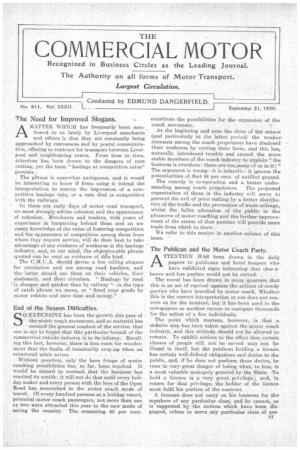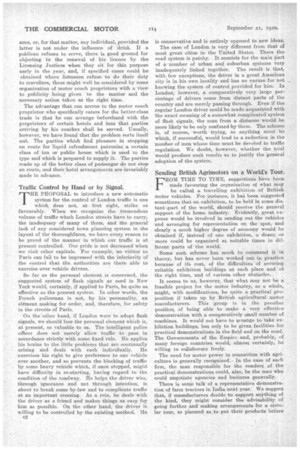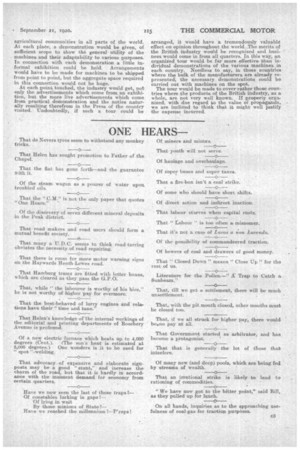The Need for Improved Slogans. .
Page 1

Page 2

Page 3

If you've noticed an error in this article please click here to report it so we can fix it.
AMATTER WHICH has frequently been men_ tioned to us lately by Liverpool merchants and others is that they are constantly being approached by eanyasseas and by postal communication, offering to contract for transport between Liverpool and neighbouring •towns. From time to time, attention has been drawn to the dangers of rate cutting, yet the term "haulage at competitive rates" persists.. .
The phase is somewhat ambiguous, and it would be interesting to know if firms using it intend the interpretation to convey the impression of a corn petitive haulage rate, or a rate that is competitive with the railways.
In these yet early days of motor road transport, we most strongly advise cohesion and the appearance of cohesion. Merchants and traders, with years of experience in bargaining behind them and an uncanny knowledge of the value of fostering competition and the appearance of competition among those from whom they require service, will do their best to take advantage of any evidence of weakness in the haulage industry, and, to our mind, the objectionable phrase quoted can beread as evidence of this kind.. The C,M.V._A: should devise a few telling slogans for circulation and use among road hauliers, and the latter should use them on their vehicles, their. stationery, and their circulars, "Haulage by road : 'is cheaper and quicker than by railway "—is the type.. of catch phrase we mean, or "Send your goods by motor vehicle and save time and money."
End of the Season Difficulties..
SO.EXTENSIVE has been. theigrOwth this year of . the MotOr coach movement, and•so matured has • -seemed-the 'general conduct a the service,that ' one is apt to fOrget that this.particular branch of the commercial •vehicie industry is in its infancy.-Recall• ing this fact, however, there is less room for wonderment that the faults of immaturity crop .tip when 'an. • occasional...crisis arises. ' • .: ' . . .
Without question, only the bare fringe of motor : coaching possibilities has, so far, beenatouched. . It . would be absurd to "contend .that the businesS" has reached its zenith: it wilI.not do that until every holiday maker and every person with the lote of the Open Road ha:s.. succumbed" to the. inbtor .coach _mode of travel. • Of every hundred persons at a holiday resort, potential moter coach passengers, not more than one or two were attracted this year to the -new mode of seeing the country. The remaining 98 per cent. constitute the possibilities for the expansion of the coach movement..
At the beginning and near the close c-f the season (and particularly at the latter period) the weaker elements among the coach proprietors have disclosed their weakness by cutting their fares, and this has, naturally, introduced trouble and caused the more stable Members of the coach industry to explain "the business is overdone : there are too.many of us in it 1" The argument is wrong—it is infantile : it ignores the potentialities of that 98 per cent. of untilled ground.
The remedy is co-operation and a better understanding among coach proprietors. The projected organization of those in the industry will serve to prevent the evil of price cutting by a better distribution of the traffic: and the prevention of waste mileage, whilst the fuller education of the public to the pleasures of motor coaehing and the further improvement of the status of that pastime will provide more trade from which to draw. _ We refer to this matter in another column of this issue. '
. .
The Publican and the Motor Coach Party.
ATTENTION HAsS been drawn " in the daily papers to publicans and hotel keepers who have exhibited signs intimating that charalbanes and bus parties would not be serVed. : The moral has been drawn in many quarters that this is an act of reprisal against the actions of rowdy parties" who have travelled by motor coach. Whether this is the correct interpretation or not does not concern us for the moment, but it has been used in the newspapers as another excuse to ca.stigate thousands for the action of a few individuals4 The point which matters, however, is that a definite step has been taken against the motor coach industry, and this attitude should not be allowed to remain. To. exhibit notices to the effect that, certain classes of people will not be served may not be illegal in itself, but the" publican holding a licenee ‘ • has certain well-defined obligations and duties to the • public, and, if he does not perform those duties, he runs in very great danger of los-ing what, to him, is a. most valuable monopoly granted by the State. To hold a licence is a very great privilege.; and, in return for that privilege, the holder of the licence must fulfil his portion of the contract.
A licenseeL does not carry on his business for the members of any particular class, and he cannot, as is suggested by the notices which have been displayed, refuse to Serve any particular class of per sons, or, for that matter, any individual, provided the latter is not under the influence of drink. If a publican refuses to serve, there is good ground for objecting to the renewal of his licence by the Licensing Justices when They sit for this purpose early in the year, and, if specified eases could be obtained where licensees refuse to do their duty to travellers, these might well be considered by some organization of motor coach proprietors with a view to publicity being given to the matter and the necessary action taken at the right time.
The advantage that can accrue to the motor coach proprietor who specifically caters for the better-class trade is that he can arrange beforehand with the proprietors of certain hotels. and inns that parties arriving by his coaches shall be served. Usually, however, we have found that the problem sorts itself out. The parties which find pleasure in stopping en route for liquid refreshment patronize a certain class of'.inn or public house which is used to the type and which is prepared to supply it. The parties made up of the better class of pasaenger do not stop en route, and their hotel arrangements are invariably made in advance. '
Traffic Control by Hand or by SignaL
THE PliOPOSAL to introduce a new automatic system for thecontrol of London traffic is one which does not, at filet sight, strike us favourably. When we recognize the tremendous volume of traffic which London streets have to carry; the inadequacy of many of them, and the generallack of any considered town planning system in the layout of the thoroughfares, we have every reason to be proud of the manner in which our traffic is at present controlled. Our pride is not decreased when we visit other capitals. For example, no vigtor to Paris can fail to be impressed with the inferiority of the control That ere authorities are there able to exercise over vehicle drivers.
So far, as the personal element is concerned, the suggested system of flash signals as used in New York would, certainly, if applied to Paris, be quite as 'effective as the present system. In other words, the French policeman is not, by his personality, an element making for order, and, therefore, for safety in the streets -of Paris.
On the other hand, if London were to adopt flash signals, we should lose the personal element which is, at present, so valnable to us. The intelligent pollee officer does not merely allow traffic to pass in accordance strictly with some fixed rule. He applies his brains to the little problems that are continually arising and deals with each individually. He exercises his right to give preference to one vehicle over another, and so prevents the blocking of traffic by some heavy vehicle which, if once stopped, might have difficulty in re-starting, having regard to the condition of the roadway. He helps the driver who, through ignorance -and not through intention, is about to break some by-law and to complicate traffic at an important crossing. As a rule, he deals with the driver as a friend and makes things as easy for him as possible. On the ether hand, the driver is willing to be controlled by the existing method. He c2 is conservative and is entirely opposed to new ideas..
The case of London is very different from that of most great cities in the United States. There the road system is patchy. It consists for the main part of a .number of urban and suburban systems very inadequately linked together. The result is that, with few exceptions, the driver in a great American city is in his own locality and has no excuse for not knowing the system of control provided for him. In London, however, a comparatively very large percentage of drivers come from distant parts of 'she country and are merely passing through. Even if the regular London driver could be made acquainted with the exact meaning of a somewhat complicated system of flash signals, the man from a distance would be more likely to be only confused by them. The scheme is, of course, worth trying, as anything must be which, if suecessful, would lead to a reduction in the number of men whose time must be devoted to traffic regulation. We doubt, however, whether the trial would produce such results as to justify the 'general adoption of the system.
Sending British Agrimotors on a Works Tour.
FROM TIME TO TIME, suggestions have been made favouring the organization of what may be called a travelling exhibition Of British motor vehicles. For instance, it hai. been suggested sometimes That-an exhibition, to be held in some distant ;part of the world, should receive the general support of the home industry. Evidently, great expense would be involved in sending out the vehicles and arranging for representation on the spot, and clearly a much higher degree of economy would be obtained if, instead of one exhibition, a dozen or more could be organized at suitable times in different parts of the world.
Some such scheme has. much to commend it in theory, but has never been worked out in Practice because of its cost, of the difficulties of securing suitable exhibition buildings at each place and at the right time, and of various other obstacles.
It seems to us, however, that what may not be a feasible project for the motor industry, as a whole, might, with modifications, be quite a practical proposition if taken up by British agricultural motor manufacturers. This group is in the peculiar position Of being able to make a very effective demonstration with a comparatively small number of machines. It would not have to arrange to take exhibition buildings, but only to be given facilities for practical demonstrations in the field and on the road. The Governments of the Empire and, probably, of many foreign countries would, almost certainly, be willing to collaborate freely.
The need for motor power in connection with agriculture is generally recognized., In the case of each firm, the man responsible for the conduct of the practical demonstrations could, also, be the man who could negotiate agencies and business generally.
There is somO talk of a representative demonstration of farm tractors in India next year. We suggest that, if manufacturers decide to support anything of the kind, they might consider the advisability of going further and making arrangements for a circular tour, so planned as to put their products before agricultural communities in all parts of the world. At each place, a demonstration would be given, of sufficient scope to show the general utility of the • machines and their adaptability to various purposes. In connection with each demonstration a little informal exhibition could be held. Arrangements would have to be made for machines to be shipped from point to point, but the aggregate space required in this connection •would not be huge. At each point touched, the industry would get, not only the advertisements which come from an exhibition, but the more live advertisements which come from practical demonstration and the notice naturally resulting therefrom in the Press of the country visited. Undoubtedly, if such a tour could be arranged, it would have a tremendously valuable' effect on opinion throughout the world. The merits of the British industry would be recognized and business would come in from all quarters. In this way, an organized tour would be far more effective than individual demonstrations of the various machines in each country. Needless to say, in those countries where the bulk of the manufacturers are already represented, the necessary demonstrations could be carried out with machines on the spot. The tour would be made to cover rather those countries where the products of the British industry, as a whole, are not very well known. If property organized, with due regard to the value of propaganda, we are inclined to think that it mightwell justify the expense incurred.








































